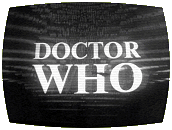 After leaving Ben and Polly at the airport, the Doctor and Jamie find that the TARDIS has gone missing. When they trace it to a Victorian antique store, they find themselves caught up in a scheme by the Doctor’s deadliest enemy to isolate the essence of what makes humans human.
After leaving Ben and Polly at the airport, the Doctor and Jamie find that the TARDIS has gone missing. When they trace it to a Victorian antique store, they find themselves caught up in a scheme by the Doctor’s deadliest enemy to isolate the essence of what makes humans human.
written by David Whitaker
directed by Derek Martinus & Timothy Combe
music by Dudley SimpsonGuest Cast: John Bailey (Edward Waterfield), Marius Goring (Theodore Maxtible), Brigit Forsyth (Ruth Maxtible), Alec Ross (Bob Hall), Griffith Davies (Kennedy), Geoffrey Colville (Perry), Jo Rowbottom (Mollie Dawson), Windsor Davies (Toby), Gary Watson (Arthur Terrall), Sonny Caldinez (Kemel), Robert Jewell (Dalek), Gerald Taylor (Dalek), John Scott Martin (Dalek), Murphy Grumbar (Dalek), Ken Tyllsen (Dalek), Roy Skelton (Dalek Voice), Peter Hawkins (Dalek Voice)
Note: The master tapes of this story were destroyed by the BBC in the early
1970s. Only episode 2 has been recovered so far.The Evil Of The Daleks has seen two audio releases. The first, in 1992 featured narration by Tom Baker. A new version was released on CD in 2003 featuring narration by Frazer Hines.
Broadcast from May 20 through July 1, 1967
LogBook entry & review by Philip R. Frey
Review: The Evil Of The Daleks is important for a couple of reasons. First, it marks the final appearance of the Daleks in the black and white era. In fact, it was intended to be the end of the Daleks, period. They would not return until the 1972 serial Day Of The Daleks.
Secondly, it marks the introduction of companion Victoria Waterfield, played by Deborah Watling. She enters into the story very much in damsel-in-distress mode and her character arc over the course of the next season is one of the more interesting aspects of early Doctor Who.
The plot is a complex one, with the Daleks actually working an end run around the Doctor that I found quite impressive, even for them. With the use of threats to Victoria and Jamie, they are able to get the Doctor to help them in their plan to isolate the “Human Factor”, the part of human beings that has allowed them to defeat the Daleks time and time again. The Doctor twists their plan to his own design, even allowing himself to decieve Jamie as part of his long-range plan. It’s all very dramatic and gives this story an edge that most Daleks-try-to-take-over-the-Universe stories lack.
This is a particularly strong outing for Frazer Hines as Jamie. He is obviously love-struck by Victoria from the first moment he sees her and the emotions she stirs in him threaten to drive a wedge between him and the
Doctor. It’s one of the few times that they are at odds and it works beautifully.
The rest of the supporting cast is good, but they are generally overpowered by the leads. John Bailey give Victoria’s father Edward Waterfield a fatalistic worldview, only willing to dtand up to them near the very end.
Marius Goring’s Theodore Maxtible, the one responsible for the Waterfields being sucked into the Daleks’ plan, is a bit too much of the obvious scientist-down-the-wrong-path type, but he’s still engaging.
With only one episode to go by, it’s difficult to talk about the visual aspects of the story, but what has survived seems to indicate another quality Victorian-era production. What we can see, thanks to home movie footage, is that the sets for the Dalek homeworld of Skaro were extremely elaborate and every bit as impressive as those seen in previous Dalek stories.
It’s a shame so much of this pivitol story is lost, but the narrated audio releases go a long way towards allowing a modern day audience the chance to enjoy this story. At seven episodes, it might be a bit longer than it needed to be, but there’s very little sense of padding, as every plot turn builds towards the shattering climax.

